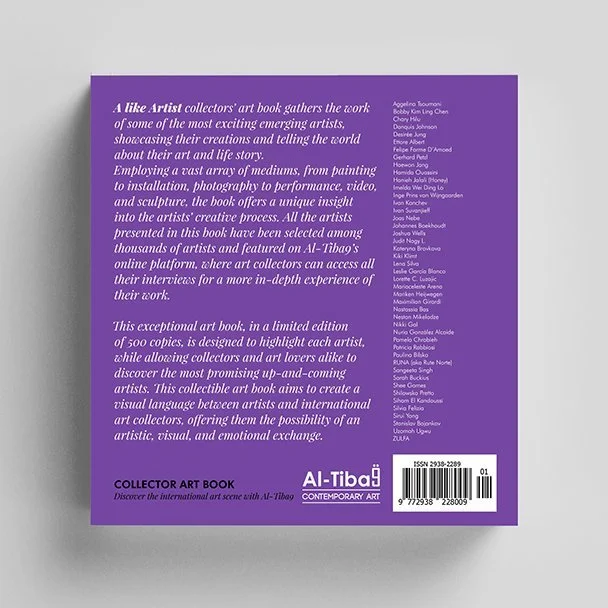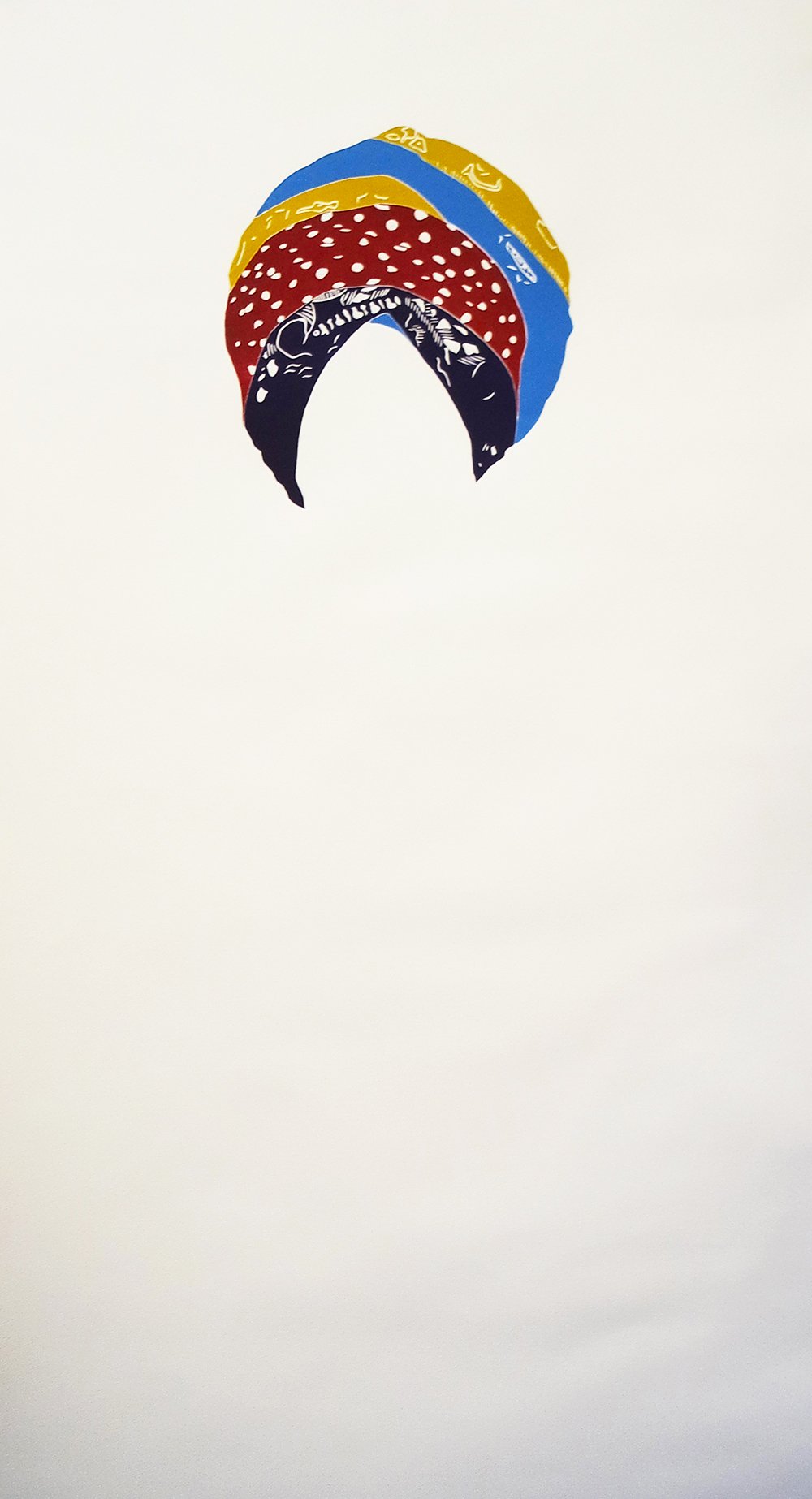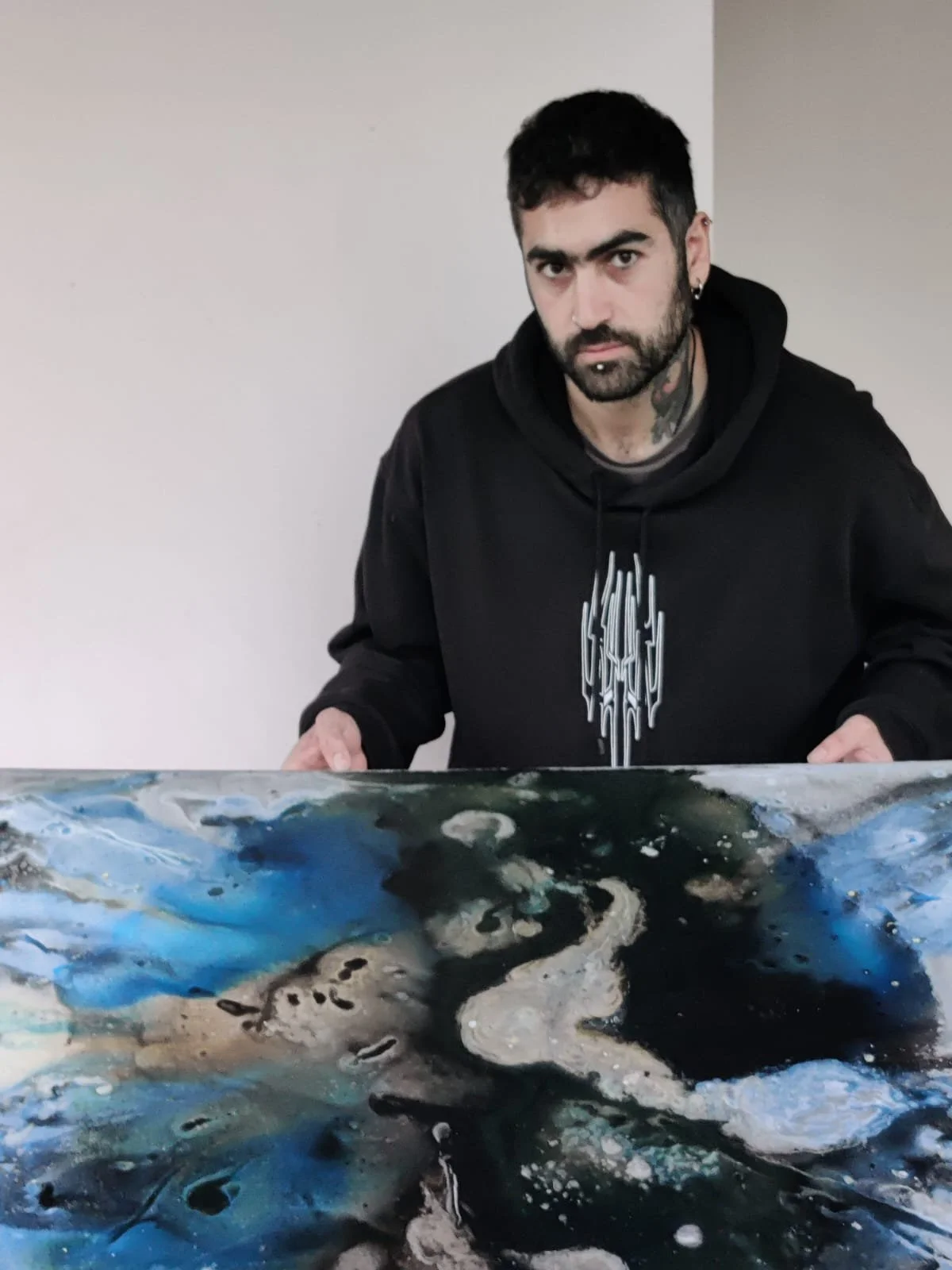10 Questions with Aggelina Tsoumani
Aggelina Ioannis Tsoumani was born in 1994 in Alexandria Imathias, in Greece. She is a graduate of the University of Western Macedonia in the field of Fine Arts, and she holds an Integrated Master's in Fine Arts from the School of Fine Arts of the University of Western Macedonia. She has specialized in printmaking and photography, and her professors were Dimitra Siaterli, Sofia Papadopoulou, and Yannis Kastritsis. She has also graduated from the vocational training institute "Xini" in 2012, specializing in Artistic Tattoo. In addition, she has worked as a graphic designer since 2021.
She was awarded the second award (Semi Grand-Prix) in the "Tokyo international Mini-Print Triennial" exhibition in 2018, held by the University of Art in Tama. In 2019 she participated in the printmaking exhibition in Haugesund, Norway, with two printmaking artworks. Also, in 2018 a printmaking artwork of her was exhibited in the Engravist 2018 in Istanbul. With Greek Printmakers' Association, she took part in "Metropolitan Art Museum" (2019 Tokyo, Japan) as a team exhibition with one print. In 2021 her printmaking artwork was chosen in the Third International Print Biennale Yerevan (Armenia), while at the same time, a print of her was exhibited in the exhibition with the title "PRINTMAKING From the Prehistory in Modern Greece" at School of Fine Arts-room Nikos Kessanlis, (Athens Greece), 2021.
Her printmaking artwork has also been published in "The HAND" Issue 20, based in Kansas, USA in 2018. In addition, photographic artwork has been selected at the 5th World Biennial of Student Photography in Serbia in 2015, while in 2018 was defined as a second choice in the exhibition ArtClash of Florence. She has also participated in the printmaking exhibition "Young Greek Printmakers 2018-2019" in the house of Cyprus, in Athens, with two printmaking works.
She has participated in various Greek and international exhibitions from 2014 like 3rd Awagami International Miniature Print Exhibition (AIMPE) Japan, Print Festival (Athens), gallery "ALMA" (Athens), TAF Theartfoundation (Athens), Telloglio Arts Institute (Thessaloniki), etc. In the first year as a fine art student, she took part in a Greek team called "En Flo" which participated in team exhibitions and acts like Art-Athina, Rem-brand Name project etc.
She has also taken part in the educational program "Florina at the Museum of Discovering life in an ancient town" in photographic part in 2016 and with digital artwork of the summer workshop in Aiani with the theme "Live Organisms" in 2017. Moreover, she is an active member of Greek Printmakers' Association since 2018 and in Chamber of Fine Arts of Greece.
Nowadays, she works as a printmaker teacher in Art Workshops based in Naousa and Art teacher in primary school in Greece. Her artworks are included in various private collections.
Aggelina Tsoumani portrait
Bodies | Project Description
An issue I am exposing in this collection is the humans and the meaning of the clothes they wear. I present works with human bodies that completely lack the element of skin and features. I focus on the postures of the bodies, the patterns of the clothes as well as the multicolor through printmaking.
I get inspiration from geometry and many cultures like Africa. My goal is to highlight the human body, completely leaving out the cosmetic factors related to the appearance of the face and skin. The "clothing'' factor is something neutral (unisex), but very often in western societies, categorized automatically between the gender either as a design (skirt for women, trousers for men) and as a color (blue for boys, pink for girls), which it is still just fabric and threads. Just simple threads that we tend as a community to categorize which cloth and color correspond to each gender, bringing the body to be considered as its hanger.
So, I focus on the creation of engraved "fabric clothing" with the aim of enclosing the human body, leaving the elements of the skin empty. I refer, therefore, to the reconstruction of the already deconstructed human body, this time in the form of puzzles and abstractions. My objective is to promote the human figure through my colorful printed textiles without taking into account the color of the skin and the beautification of the facial features. The printmaking techniques that I choose are etching, linocut, collagraph, carborundum, monotype, and aquatint-black technique, and I print the pieces successively on the cotton paper to create the "engraving puzzle". I use intense and multiple color combinations at the same time in motifs and hair, where I place them in specific places on the cotton paper, which enclose imaginary human limbs as they compose the present bodies.
GRAY BRAID, printmaking, linocut aquatint collagraph, 150x75 cm, 2018 © Aggelina Tsoumani
DREAMING, printmaking, linocut aquatint monotype, 150x75 cm, 2018 © Aggelina Tsoumani
Limited edition art collectors’ book
INTERVIEW
First of all, introduce yourself to our readers. What are your history and your artistic background?
My name is Aggelina Tsoumani, and I live in Veria, Imathia, a city in Greece where I work at art workshops as a printmaking teacher and at a primary school as an art teacher. My story started when I was a kid, and I loved to paint. Consequently, as a teenager, I decided to study Fine Arts as it was my main goal from an early age, so I took exams and passed in 2013. However, I decided that I wanted to be an active member as a postgraduate student in the art world. I started from the early semester participating in exhibitions as a volunteer by helping other artists set up various exhibitions. As a result, so far, I have participated in over 35 group exhibitions both in Greece and abroad, and I have a 2nd prize award, Semi Grand-Prix in "Tokyo international Mini-Print Triennial" 2018. At the same time, I studied artistic tattoos and took graphic design classes because they are directly related to the arts and definitely included in my personal artistic concerns. Today I am an active member of the Greek Printmakers' Association and in the Chamber of Fine Arts of Greece.
You primarily work with printmaking. What are the main themes behind your work?
First of all, when I entered the school of fine arts, I had no particular knowledge about printmaking. This came later when I met the printmaking lab, and from the second semester of school, I decided that it was exactly the direction that I wanted to follow. Also, I was interested in the field of colour in which I found myself totally excited through printmaking. Initially, I started with geometric shapes that I repeated as a pattern. After that, I realized the possibilities of printmaking, so I started to include the human body first by coloring with black colour and then the multicolor for a more realistic result. Later, geometry and the human bodies became one. Clothing, fashion, and multiple printmaking techniques played a crucial role in my personal research.
GRACE, printmaking, linocut aquatint, 190x75 cm, 2018 © Aggelina Tsoumani
What do you hope that the public takes away from it?
First of all, I would like people to taste printmaking and how many possibilities they could have through it as they realize that there are no limits about size, technique, theme, or colour as we can include a lot of different printmaking techniques in one result. However, the view of an artwork is a very personal hypothesis for an individual in how they perceive the point of view of a project and what emotions it can bring out in them.
Patterns have a central role in your production. What do they represent for you? And how do you create those patterns?
The repetitive view has always had a place in my observation, something I found extremely interesting to explore. Also, clothes with patterns take place in my wardrobe as well as in my art projects. They somehow enhance my desire to enter the shape-colour world that creates patterns and see them from an even closer look. Patterns are usually created by observing either existing fabrics or drawing new ones from different shapes, and from time to time, I observe, draw and assemble into a result. Fashion plays a main role, and some designers such as Vivienne Westwood and Matty Bovan who combine many different fabrics together in one common result. Somehow I try to do the same thing through printmaking, but instead of real fabrics, I use many printmaking techniques.
There is a growing attention towards sustainability, both in the art world as in the fashion and textile production. As your work aims to create textile patterns, what is your opinion on this matter? Is it just a trend or do you think this can sparkle a real change?
Sustainability and recycling are key issues that need to be addressed in an even greater context and scope. My view is in favor of creating great quality clothes with the aim of fewer natural resources in order to prevent any ecological crisis. I firmly believe that with any better information of citizens and actions in ecology, we can really do wonders.
SCARF, printmaking, linocut, 150x75 cm, 2018 © Aggelina Tsoumani
TURBAN, printmaking, linocut, 150x75 cm, 2018 © Aggelina Tsoumani
What other sources of inspiration do you have for your work?
I can derive inspiration from various fields. I mentioned above that fashion plays a key role in my research as well as the music world by artists who already integrate various musical instruments or sounds into one result. I also, of course, get inspiration from painters such as David Hockney, Yayoi Kusama, Lucas Samaras, Julian Opie, etc. Moreover, nature and the history of other cultures contribute positively to research development.
Over the past two years, we have witnessed a lot of changes in the art world as well as in our lives in general. What is one thing that you miss about your life pre-Covid, career and art wise?
Nowadays, the situation that we are living in sometimes reminds scenario of science fiction movies. On the other hand, people tend to adapt in every situation as hard as possible, so my point is that we are adapted very quickly in various situations and Covid-19 has become a big and indivisible part of our lives. I really miss a "fearless" hug and generally socializing with people without having my mind the pandemic concept. Moreover, another thing that in my opinion was a little easier before Covid-19, was maybe the decision to go abroad either for studies or for a leisure trip and why not see an exhibition in a museum, gallery, etc. or even to socialize and communicate with new people without the fear of the pandemic. These are some things that I miss too, and maybe I think twice and thrice about moving to another country compared to before the pandemic.
And what is one new thing that you have discovered? Did you participate in any online exhibition or event?
I have discovered that with will and some actions, things can continue to be happening, for example, with the chance of online exhibitions of artworks that, even just in digital form, did not stop being held and people participated in them. I participated in the "ON PAPER" digital exhibition based in Barcelona in early 2021.
JACKET, printmaking, linocut, 100x70 cm, 2018 © Aggelina Tsoumani
Is there anything new you would like to experiment with?
I would like to experiment and why not engage the part of printmaking with that one of sculpture. I have had it in my mind for a long time and I hope at some point to put it forward and practice on it. Also, the part of eco-friendly printmaking is one of the topics that concern me, and I would like to expand it to an even greater place, to be even friendlier to humans and the environment.
Finally, what are your plans for the future? Any new project or exhibition you want to tell us about?
As I mentioned above, I am interested in expanding and enhancing my personal knowledge with studies abroad with a postgraduate degree and a Ph.D. in the arts and living abroad for a while. Regarding the exhibitions, at the moment, there is a very important exhibition in Athens entitled "ENGRAVING from Prehistory in Nowadays Greece" at the School of Fine Arts-Nikos Kessanlis Hall with an introduction to the first engravings from China, France, and Greece. Then it continues with the European engraving of the Middle Ages, the Renaissance, Impressionism, and Japanese Art (from private collections). This course ends with engravings by printmakers of Greece, members of "Chamber of Fine Arts of Greece" (from private collections) with works of Printmakers who are no longer alive and many of whom demonstrated important events of the modern history of Greece through their artworks. However, prints from contemporary printmakers, some of which demonstrate the technical development of digital printmaking in Greece are also exhibited. I participate in this exhibition with one artwork of dimensions 150x75cm combined by three printmaking techniques.
























